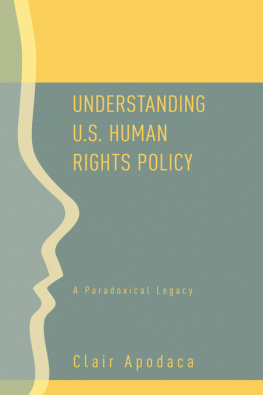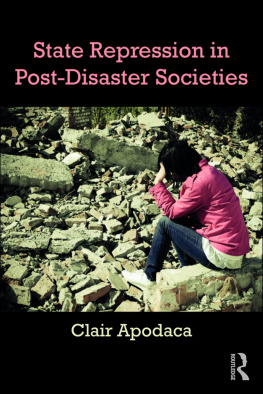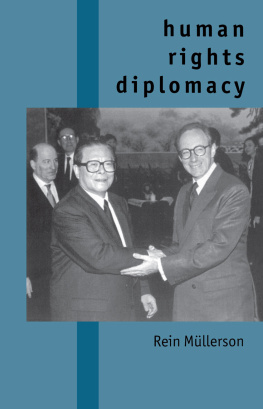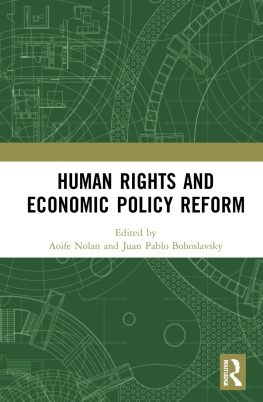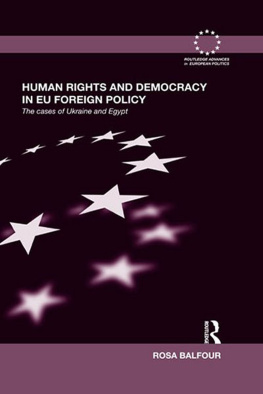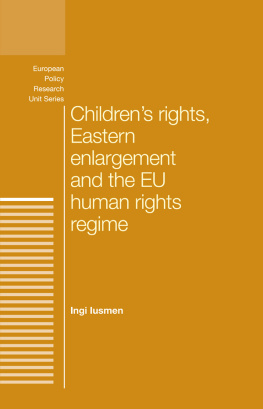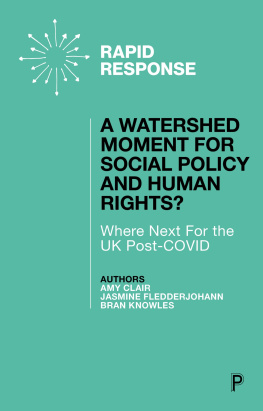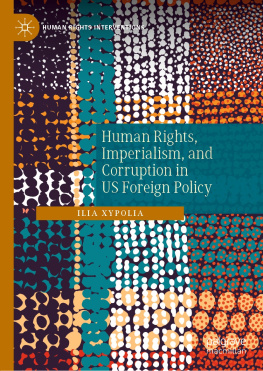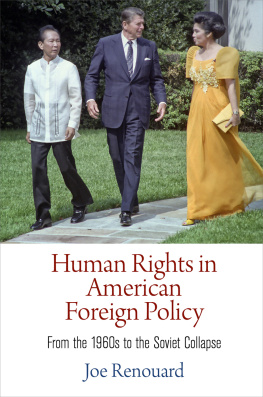UNDERSTANDING U.S. HUMAN RIGHTS POLICY
UNDERSTANDING U.S. HUMAN RIGHTS POLICY
A Paradoxical Legacy
Clair Apodaca
Published in 2006 by
Routledge
Taylor & Francis Group
270 Madison Avenue
New York, NY 10016
Published in Great Britain by
Routledge
Taylor & Francis Group
2 Park Square
Milton Park, Abingdon
Oxon OX14 4RN
2006 by Taylor & Francis Group, LLC
Routledge is an imprint of Taylor & Francis Group
Printed in the United States of America on acid-free paper
10 9 8 7 6 5 4 3 2 1
International Standard Book Number-10: 0-415-95423-1 (Softcover)
International Standard Book Number-13: 978-0-415-95423-5 (Softcover)
Library of Congress Card Number 2006008695
No part of this book may be reprinted, reproduced, transmitted, or utilized in any form by any electronic, mechanical, or other means, now known or hereafter invented, including photocopying, microfilming, and recording, or in any information storage or retrieval system, without written permission from the publishers.
Trademark Notice: Product or corporate names may be trademarks or registered trademarks, and are used only for identification and explanation without intent to infringe.
Library of Congress Cataloging-in-Publication Data
Apodaca, Clair, 1956-
Understanding U.S. human rights policy : a paradoxical legacy / Clair Apodaca.
p. cm.
Includes bibliographical references and index.
ISBN 0-415-95422-3 (hardcover : alk. paper) -- ISBN 0-415-95423-1 (pbk. : alk. paper)
1. Human rights--United States--History. 2. United States--Foreign relations--20th century. 3. United States--Foreign relations--2001- 4. United States--Politics and government--20th century. 5. United States--Politics and government--2001- I. Title: Understanding US Human rights policy. II. Title.
JC599.U5A75 2006
323.0973--dc22
2006008695
Visit the Taylor & Francis Web site at http://www.taylorandfrancis.com
and the Routledge Web site at http://www.routledge-ny.com
This book is dedicated to my husband and colleague, Franois Debrix, the man who has diligently read every word I have ever put to paper and loves me nonetheless.
CONTENTS
ACKNOWLEDGMENTS
There are several people to whom I owe a debt of thanks for their support, suggestions, and advice when I took up this project. First, and foremost, I would like to thank Franois Debrix for his constant encouragement and, when needed, prodding in the writing of Understanding U.S. Human Rights Policy: A Paradoxical Legacy. I would also like to thank Michael Stohl for igniting my intellectual interest and guiding my study in human rights policy. A thank you goes to Nick Onuf, Patricia Price, and Cindy Weber for their sage advice. And among my colleagues in the profession who provided direction throughout my career are David Cingranelli, Mark Gibney, T. David Mason, Julie Mertus, Eric Neumayer, and Steven Poe. I would also like to acknowledge Robert Tempio, my editor, for his tireless support of my work.
INTRODUCTION
The Paradoxes of U.S. Human Rights Policy
The history of U.S. human rights policy is a series of different paradoxes that change depending on the presidential administration. Far from paralyzing the development of U.S. human rights policy, these paradoxes move the policy forward and give it its meaning and importance. U.S. human rights policy is the outcome of the intricate power struggle, inconsistencies, and contradictions between the major actors in the foreign policy decision-making process. Understanding U.S. Human Rights Policy: A Paradoxical Legacy examines the erratic evolution of U.S. human rights policy, often the product of the conflict and cooperation among the major foreign policy makers, with particular attention being paid to the tensions between presidential preferences and unfolding political events, and to the allocation of U.S. economic and military foreign aid. The allocation of foreign aid is influenced by the evolving, continuing, and paradoxical values, ideals, and beliefs of the various policy makers.
The U.S. Constitution protects the integrity of the American political system with a system of checks and balances. Congress and the Executive share powers in the making of U.S. foreign policy. This ostensibly prudent allocation of power conceals the power struggle that takes place between the executive and the legislative branches of the U.S. government in the making of foreign policy. The constitutional grant of overlapping powers between the Executive and Congress has been called an invitation to struggle for the privilege of directing American foreign policy (Corwin 1957, 171). This constitutionally imposed struggle in foreign policy making is made more convoluted by the significant role played by other organized interests, such as the governmental bureaucracy, advocates, and nongovernmental interest groups (nongovernmental organizations, or NGOs).
Americas practice of foreign policy is based on the opposition between idealist principles and the realist balance of power. The idealist segment of the United States foreign policy making structure has always been concerned with the moral content of U.S. foreign policy. For proponents of idealism, the question of foreign policy ought not to be one of power and domination, but instead one of social justice and equality. By contrast, for the realists, foreign policy is dominated by the states international struggle for power. In this view, foreign policy makers are rational actors and, under international conditions of anarchy and self-help, must be power maximizers to ensure national survival. Foreign aid, one of the many tools available to foreign policy decision makers, is an important instrument through which U.S. human rights policy is supposed to be established. Foreign aid fulfills both ideological needs: it promotes moral principles while preserving the national security of the United States. Foreign aid is a particularly powerful method of congressional control over the Executives foreign policy behavior since the president is dependent on Congress to appropriate the funds. Congress can modify or terminate foreign aid programs by attaching rigid conditions, exhaustive stipulations, and meticulous specifications to the foreign assistance legislation. Thus, the inclusion of human rights into the Foreign Assistance Act of 1961 was a crucial procedure in Congress effort to restrain presidential powers while acting as a salve to heal the conscience of the American public for the perceived immorality of U.S. foreign policy.
The policy process directly impacts the policy outcome. There is often a disparity between what Congress legislates or the president negotiates and the actual policy implementation. The bureaucracy has the ability to resist, reform, or remake unpopular legislation. Bureaucratic politicsthe jostling and even rivalries among various agencieshas long characterized policy making and often frustrated the successful performance of U.S. foreign policy.
Understanding U.S. Human Rights Policy is intended to ground the international relations student and foreign policy practitioner in an understanding of the historical and political conflict and cooperation involved in the making and implementing of American human rights policy. Moreover, an understanding of the complex and convoluted historical record, along with an analysis of the formation of human rights policy, is vital to any reader interested in contemporary human rights issues. An interested and newly awakened American public concerned with the reports and accusations of U.S. violations will find the paradoxical nature of U.S. human rights policy revealing. The chronological approach of this book will provide the reader with the historical, social, and cultural context of the development and implementation of U.S. human rights policy.

